- Home
- Quizzes
- My Quiz Activity
- Newsletters
- Sports Betting
- MY FAVORITES
- Add Sports/Teams
- SPORTS
-
NFL
- NFL Home
- Arizona Cardinals
- Atlanta Falcons
- Baltimore Ravens
- Buffalo Bills
- Carolina Panthers
- Chicago Bears
- Cincinnati Bengals
- Cleveland Browns
- Dallas Cowboys
- Denver Broncos
- Detroit Lions
- Green Bay Packers
- Houston Texans
- Indianapolis Colts
- Jacksonville Jaguars
- Kansas City Chiefs
- Las Vegas Raiders
- Los Angeles Chargers
- Los Angeles Rams
- Miami Dolphins
- Minnesota Vikings
- New England Patriots
- New Orleans Saints
- New York Jets
- New York Giants
- Philadelphia Eagles
- Pittsburgh Steelers
- San Francisco 49ers
- Seattle Seahawks
- Tampa Bay Buccaneers
- Tennessee Titans
- Washington Commanders
-
MLB
- MLB Home
- Arizona Diamondbacks
- Atlanta Braves
- Baltimore Orioles
- Boston Red Sox
- Chicago White Sox
- Chicago Cubs
- Cincinnati Reds
- Cleveland Guardians
- Colorado Rockies
- Detroit Tigers
- Houston Astros
- Kansas City Royals
- Los Angeles Angels
- Los Angeles Dodgers
- Miami Marlins
- Milwaukee Brewers
- Minnesota Twins
- New York Yankees
- New York Mets
- Oakland Athletics
- Philadelphia Phillies
- Pittsburgh Pirates
- San Diego Padres
- San Francisco Giants
- Seattle Mariners
- St. Louis Cardinals
- Tampa Bay Rays
- Texas Rangers
- Toronto Blue Jays
- Washington Nationals
-
NBA
- NBA Home
- Atlanta Hawks
- Boston Celtics
- Brooklyn Nets
- Charlotte Hornets
- Chicago Bulls
- Cleveland Cavaliers
- Dallas Mavericks
- Denver Nuggets
- Detroit Pistons
- Golden State Warriors
- Houston Rockets
- Indiana Pacers
- Los Angeles Clippers
- Los Angeles Lakers
- Memphis Grizzlies
- Miami Heat
- Milwaukee Bucks
- Minnesota Timberwolves
- New Orleans Pelicans
- New York Knicks
- Oklahoma City Thunder
- Orlando Magic
- Philadelphia 76ers
- Phoenix Suns
- Portland Trail Blazers
- Sacramento Kings
- San Antonio Spurs
- Toronto Raptors
- Utah Jazz
- Washington Wizards
-
NHL
- NHL Home
- Anaheim Ducks
- Arizona Coyotes
- Boston Bruins
- Buffalo Sabres
- Calgary Flames
- Carolina Hurricanes
- Chicago Blackhawks
- Colorado Avalanche
- Columbus Blue Jackets
- Dallas Stars
- Detroit Red Wings
- Edmonton Oilers
- Florida Panthers
- Los Angeles Kings
- Minnesota Wild
- Montreal Canadiens
- Nashville Predators
- New Jersey Devils
- New York Islanders
- New York Rangers
- Ottawa Senators
- Philadelphia Flyers
- Pittsburgh Penguins
- San Jose Sharks
- Seattle Kraken
- St. Louis Blues
- Tampa Bay Lightning
- Toronto Maple Leafs
- Vancouver Canucks
- Vegas Golden Knights
- Washington Capitals
- Winnipeg Jets
- NCAAF
- NCAAM
- Boxing
- Entertainment
- Lifestyle
- Golf
- MMA
- Soccer
- Tennis
- Wrestling
- More Sports
- RESOURCES
- My Account
- YB on Facebook
- YB on Twitter
- YB on Flipboard
- Contact Us
- Privacy Policy
- Terms of Service

A history of athletes and activism
Throughout history, the events of the world have often intertwined with the events taking place around competition. In other words, “sticking to sports” has never been quite that cut and dry. In every corner of sports, athletes have long been some of the most vocal and expressive leaders on the forefront of change in society. Here is a look at some of the most well-known people, events and moments in the history of activism in sports.
2020 NBA Restart
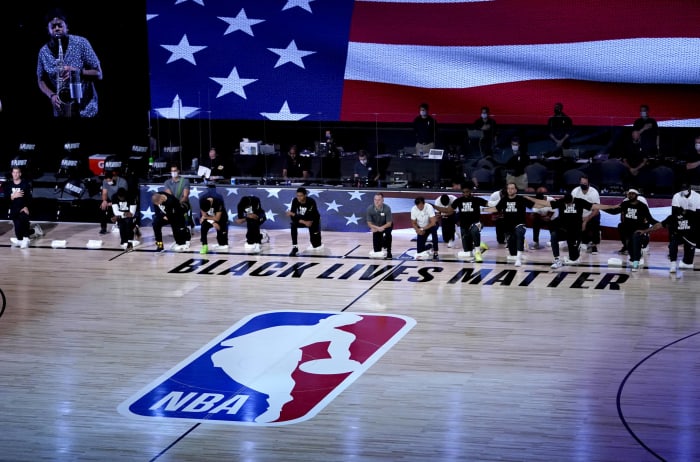
In 2020, massive civil rights uprisings in the wake of the murder of George Floyd were running parallel with the NBA’s efforts to resume its season amid the COVID-19 pandemic. Many players provided their voice and actions to the protests around the nation and wanted for it to be very evident as a part of the resumption in play. In response to this, the league featured a number of unavoidable visual statements to the game. Black Lives Matter was displayed across the court, while the vast majority of jerseys saw the player’s names replaced with a statement in the name of policy and human rights change.
2020 Milwaukee Bucks

On August 26 2020, the sports world came to sudden stop. Two days after the police shooting of Jacob Blake in Kenosha, Wisconsin, the Milwaukee Bucks refused to take the floor for their playoff game against the Orlando Magic. In the wake of this decision, all other NBA teams refused to play their playoff games as well indefinitely, causing a de facto stoppage of the recently resumed season. Joining the NBA was the WNBA, Major League Soccer, the cancellation of five Major League Baseball games (led by the Milwaukee Brewers) and several individual contributors as well. It was an unprecedented moment in sports history and athletes taking power into their own hands.
2020 MLB Opening Day

As Major League Baseball started its 2020 season, many of its players joined in solidarity of the Black Lives Matter movement and calls for social justice. Although the numbers of African-Americans within the game had dwindled over the past decade, their presence was heard loudly and supported by their teammates and the league. African-American players such as Mookie Betts, Jack Flaherty, Tim Anderson and Josh Bell led the way with their voices and calls for justice from a sport where underrepresentation has become the norm. On Opening Day, a stylized MLB/BLM logo was featured on the pitching mound, while patches were worn on jersey sleeves.
Kareem Abdul-Jabbar

Abdul-Jabbar was a prominent activist throughout his career, championing the rights of equality, race, religion and faith. In the summer of 1968, the then Lew Alcindor joined the Muslim faith and changed his name to Kareem Abdul-Jabbar. In the same year, he boycotted participating in the Olympics in protest of how African-Americans were treated by the United States.
Mahmoud Abdul-Rauf

In 1996, Abdul-Rauf refused to stand for the national anthem and called both the song and the American flag signs of oppression. This refusal to stand drew a suspension from NBA commissioner David Stern. Eventually, when Abdul-Rauf did agree to stand again, he would only do so lowering his head and closing his eyes while reciting an Islamic prayer for those suffering from oppression. Both acts sparked fervent anger nationwide from those who opposed his anti-American positions and even saw his home burned down in Mississippi in 2001.
Muhammad Ali

Arguably the greatest activist in sports history, whose significant stance outside of the ring rival even his unparalleled work within it. Born Cassius Clay, he converted to the Muslim faith and aligned himself with the Nation of Islam, changing his name in the process and unapologetically supporting causes that served the advancement of African-Americans. In 1966, Ali refused to be drafted in the Army, citing his religious beliefs and how the cause of the war did not align with them. He was stripped of his heavyweight title and missed many of the best years of his career but remained steadfast in his beliefs and causes throughout his life.
Akim Aliu

In May, Aliu brought the issue of racial inequity to a place that it has rarely reached: professional hockey. In a self-penned deep-dive into the experiences of his career, Aliu challenged the culture of the sport and explicitly outlined several disturbing acts perpetuated against him when he refused to assimilate into the sport’s rank-and-file traditions. It was a stunning pulling back of the curtain into a space in pro sports that few blacks inhabit.
Carmelo Anthony
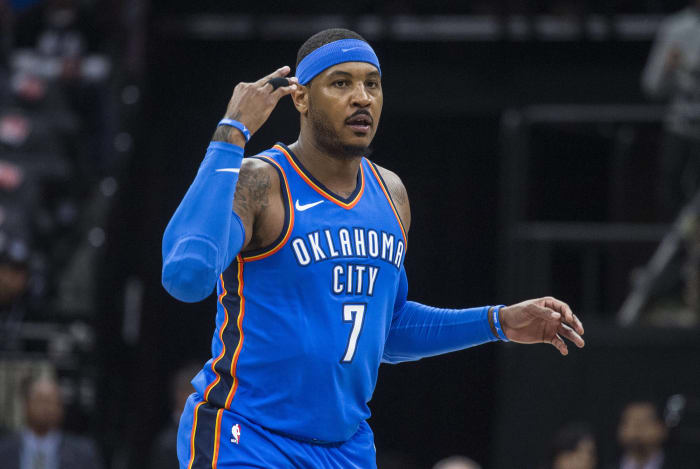
Anthony has been a highly vocal advocate against police violence and the treatment of African-Americans. In 2015, he marched with demonstrators against the death of Freddie Gray from police brutality in his hometown of Baltimore. Joined by LeBron James, Chris Paul and Dwyane Wade, Anthony also gave an impassioned speech on race and violence at the 2016 ESPYs.
Arthur Ashe

The definition of a barrier-breaker, Ashe shattered walls as an athlete and activist. When he was denied a visa to play in a tournament in South Africa, Ashe dedicated himself to exposing the injustices of apartheid in the country and was arrested for protesting the treatment of Haitian refugees. After contracting AIDS during heart bypass surgery, he created a foundation for research on the disease. The Arthur Ashe Learning Center continues to fund various research to this day.
Leonard Bates
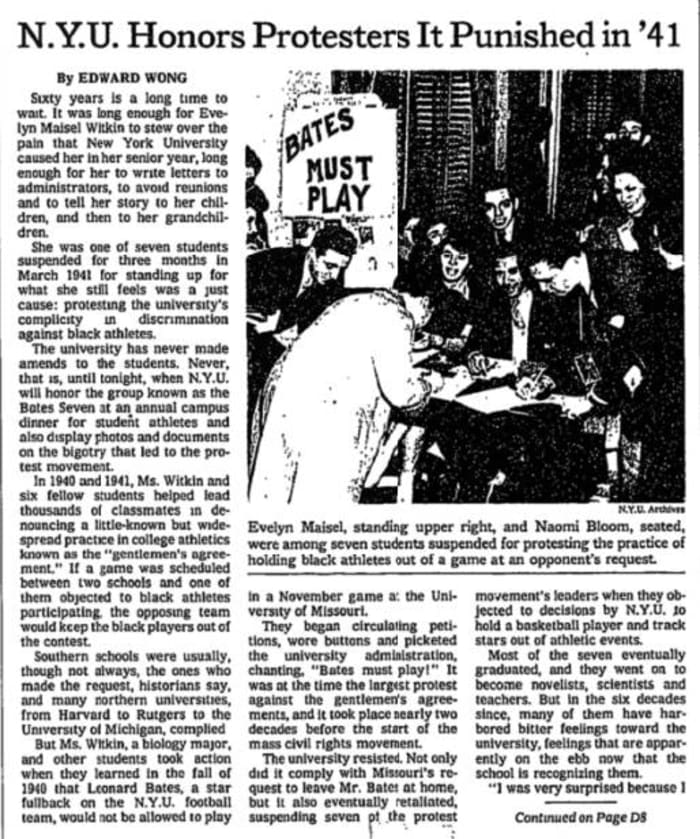
In 1940, Bates was a star fullback at New York University. However, when NYU traveled to play at the University of Missouri, the school asked that he not be allowed to play against them — which NYU agreed to. In protest, seven players objected to this at a student council meeting and were subsequently suspended for three months. The protest against the Jim Crow policy saw the group become "The Bates Seven."
Elgin Baylor
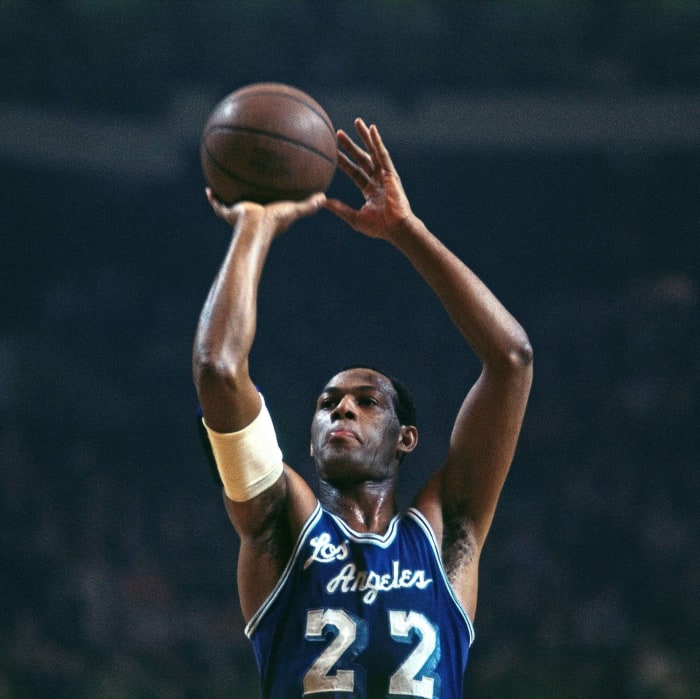
Baylor regularly used his stature in basketball to leverage for change. As a rookie in 1958, after himself and two other black teammates were told they couldn’t stay at team hotel in Charleston, West Virginia, they boycotted the game the next day. Later in 1964, minutes before the first widely televised NBA All-Star Game was scheduled to start, Baylor helped to lead a threatened strike against the game due to owners refusing to recognize the newly formed players' union.
Martellus and Michael Bennett

There is no topic that is off the table for the Bennett brothers, arguably two of the most outspoken siblings in sports history. Whether it be championing the Black Lives Matter movement, calling out the NCAA on inequities toward student-athletes or speaking against disadvantageous political positions, both Martellus and Michael are comfortable with being confrontational. In 2017, Michael declined an NFL trip to Israel due to his support of Palestine. Meanwhile, Martellus has become an author and owner of a media production company, The Imagination Agency.
1973 Brown Cheerleaders

In 1973, eight members of the all-black cheerleading squad refused to stand for the playing of the national anthem before a game vs. Providence College. They took the stance on the grounds that the song and what it stood for did not represent them. Following the fallout from the act, university president Donald Hornig defended the act and the freedom of expression it was sourced from.
Jim Brown

Brown was an early activist for the rights of athletes earning their due within the game. During his playing days in Cleveland, he founded the Black Economic Union, which facilitated black athlete involvement and investment in black-run business ventures. Brown was also one of the highest-profile athletes to step up and publicly support Muhammad Ali during his refusal to be drafted into the Army. He also broke barriers during his acting career, where he was billed ahead of significant white co-stars Burt Reynolds and Rachel Welch for “100 Rifles" and had one of the first interracial love scene, with Welch, on film as well.
John Carlos and Tommie Smith

One of the most defiant and memorable meetings of sports and civil rights history occurred on the medal stand during the 1968 Olympics. After receiving the gold and bronze medals, respectively, in the 200m sprint, as the national anthem began, Tommie Smith and John Carlos adorned black gloves and instead of putting their hands over their hearts, they raised them to the sky. The fist signified the civil rights struggle for African-Americans and resoundingly ushered in the “Black Power” movement onto a global stage.
Roberto Clemente

For Latin and Caribbean players, Clemente is the equivalent of Jackie Robinson. His excellence on the field opened doors that had previously been closed for players from Latin America. However, it was his unwavering dedication to his service to humanity that truly separated him from the pack. He worked determinedly to create greater accessibility for Latins to the game, was an unparalleled humanitarian and worked in the service of others literally until the moment of his tragic death, during a delivery of supplies to earthquake-stricken Nicaragua.
Al Davis

Davis broke several diversity and civil rights barriers from the ownership seat during his 45 years as owner of the Raiders. During road games, he refused to allow his white and black players to be separated in hotels. He also became the first owner to hire an African-American head coach (Art Shell), the second Latino head coach (Tom Flores) and the first female chief executive officer (Amy Trask).
Carlos Delgado

Throughout his career, Delgado was known for being in strong opposition to violence and war. When the playing of “God Bless America” became a regular event during the seventh inning stretch, Delgado objected by continuing to sit in the dugout while other players stood. Delgado went on to explain that the purpose of playing the song aligned with the timing and cause of the Iraq War, which he did not agree with.
Chris Ernst

In 1976, Olympic rower Ernst led 18 of her teammates at Yale University in a protest against unequal facilities being provided for female athletes in comparison to their male counterparts. They took the protests into the office of university president, where they removed their shirts to reveal “Title IX” written across their bodies. The subsequent media coverage of the protest and the details that caused it led to Yale being pressured into evening up the conditions for all their athletes.
The Fierce Five

Consisting of Gabby Douglas, McKayla Maroney, Aly Raisman, Kyla Ross and Jordyn Wieber, the 2012 US Women’s Gymnastics team captured the second team gold medal for America all time. However, their greatest victory came when they helped to expose the rampant sexual abuse of trainer Larry Nassar. They stepped into the spotlight with a fearlessness that belied their age, and they became outspoken catalysts toward ending one of sport’s most disturbing scandals.
Curt Flood
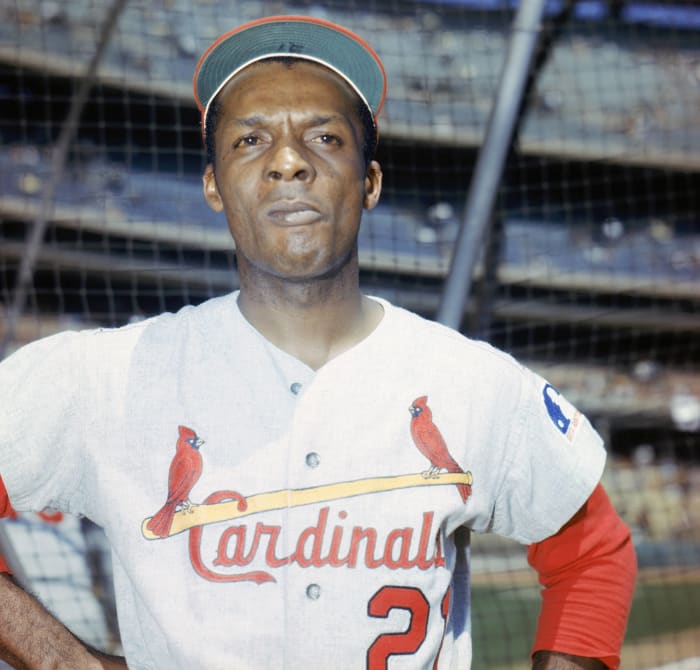
Flood changed the course of sports history forever when he rejected his trade from the St. Louis Cardinals to the Philadelphia Phillies. He challenged baseball’s longstanding reserve clause, which he compared to slavery in regard to how players had no say in their movement over the course of their careers. He challenged this rule all the way to the U.S. Supreme Court, where he lost the case, but subsequently caused change that resulted in free agency coming to be. The process cost Flood his career but ushered in market equity for players across the sports landscape forever.
Rube Foster

In the days when African-Americans were universally blackballed from the ranks of Major League Baseball, Andrew “Rube” Foster stepped up to fill the void. His Negro National League provided structure and a place to compete for many of the greatest ballplayers of the time. Starting in 1920, the legendary Negro Leagues were an extension, an establishment and a launching point for a black baseball product that by all accounts equaled — if not exceeded — that of Major League Baseball.
Althea Gibson

In 1950, no black woman had ever competed in the US Open. Gibson, who dominated competition at Florida A&M University, had been notified she would be up for consideration based on her on-court merits alone, but an invitation had not materialized. Following a stunning letter from four-time national champion Alice Marble on her behalf, Gibson was admitted to the tournament. Once in, she faced the reigning Wimbledon champion Louise Brough underneath a hail of racial slurs and pushed her to the third set before falling. In the process, she endured and proved she more than belonged.
Shaquem Griffin

Griffin’s presence alone is in defiance of the expectations of professional sports. Born with amniotic band syndrome, Griffin had his left hand amputated due to severe pain at 4 years old. He continued on to have a stellar football career, including being named an All-American in his senior year at Central Florida. With the aid of a prosthesis, Griffin performed 20 reps on the bench press at the NFL Combine while running the fastest 40-yard dash (4.38) by a linebacker in combine history.
Andrew Hawkins

Ahead of the Cleveland Browns/Cincinnati Bengals game in 2014, wide receiver Andrew Hawkins used his pregame introduction to make a statement against police violence. He wore a T-shirt in protest of the recent deaths at the hands of police of Tamir Rice and John Crawford in Ohio in 2014. The back of the shirt stated the phrase “The Real Battle of Ohio." Hawkins ignited the ire of the Cleveland police department, who demanded that the Browns and Hawkins issue an apology.
Craig Hodges

When the Chicago Bulls went to the White House following their championship in 1992, Craig Hodges took the opportunity to directly address the issues of inequity to President George Bush. Wearing a dashiki, he handed the president a letter addressing the issues of racism and opposition to the Gulf War. Shortly after the visit, he was released by the Bulls and never played in the NBA again.
Willie Horton

In 1967, racial tension in Detroit had come to a head, with riots spreading throughout the streets of the city. Following a game against the New York Yankees in July, Horton, a Tigers outfielder and Detroit native, headed directly out of Tiger Stadium into the heart of the riots. There he stood atop a car, still in full uniform, to attempt to quell some of the violence that was engulfing the neighborhood he grew up in.
LeBron James

James has been one of the most outspoken athletes of his generation, at a time when civil unrest has been at its highest since the 1960s. In 2012, his Miami Heat wore hoodies in protest of the shooting death of Trayvon Martin in Florida. Two years later, he was the most prominent NBA player to wear the “I Can’t Breathe” T-shirts in protest of the death of Eric Garner at the hands of New York City police. In 2020, James helped to establish “More Than A Vote," an organization geared at fighting voter suppression and helping to get out the black vote.
Magic Johnson

Johnson’s announcement of being infected with HIV in 1991 changed the outlook on the disease forever. He established the Magic Johnson Foundation to help further HIV research and advocated for an expansion of Medicaid to help cover the financial burden of treatment for HIV and AIDS on low-income people. In 1992, shortly after joining the National Commission on AIDS, he resigned and called out the White House for ignoring recommendations from the panel on how to implement new policies to focus on the disease.
Colin Kaepernick

In 2016, Kaepernick quietly took a knee during the national anthem during a preseason game against the Green Bay Packers. Over the next few weeks, his silent protest ignited a national uproar that continues to rage on to this day. Kaepernick made the statement in objection to the increasing cases of police violence against minorities across America. To date, the decision essentially cost Kaepernick his NFL career but in the process transformed him into one of the most significant and unapologetic activists in sports history.
Evander Kane

One of the few elite people of color in the NHL, Kane stepped up to use his voice during the Black Lives Matter movement in the wake of the death of George Floyd. Along with former NHLer Akim Aliu, Kane formed the Hockey Diversity Alliance, an independent organization aimed at forming significant changes in the presence of minorities in professional hockey. Regarding the organization, Kane stated “We are hopeful that anyone who puts on skates or sits in the stands will do so without worrying about race, gender or socioeconomic background and will be able to express their culture, identity, values and personality without fear of retribution."
Steve Kerr and Gregg Popovich

Two of the most successful coaches in NBA history, both Kerr and Popovich also have been two of the most prominent voices against inequities in society, specifically against minorities. Kerr has been a staunch gun control supporter and has remained at odds over the policies and approach of Donald Trump during his presidency. Meanwhile, Popovich has also been critical of Trump’s presidency and has been a major supporter of women’s rights. In 2014, he made Becky Hammon the first woman to be a full-time assistant coach in NBA history.
Billie Jean King

In 1973, King took the spotlight in the fight to bring gender equality to tennis. She organized the Women’s Tennis Association, which still carries on to this day. Furthermore, she legitimized it by threatening legal action if the purses for the women’s tournaments did not equal that of men. To top things off, she played in the famous “Battle of the Sexes” match against men’s champion Bobby Riggs, defeating him in front a sold-out crowd of 30,000 at the Houston Astrodome and another 5 million television viewers. King has also been a longtime advocate on behalf of the LGBTQ community.
Chris Kluwe

While Kluwe spent eight successful seasons as punter for the Minnesota Vikings, his voice on social issues outdistanced any of his kicks. Never one to hold his tongue, Kluwe has been an active supporter of same-sex marriage, writing several articles challenging policies against it. After being released by the Vikings in 2013, Kluwe stated that the decision was made by the Vikings based on his vocal support of LGBTQ rights, as he had several internal run-ins while with the team because of them.
Bruce Lee

Although Lee is best known for his legendary film career and tragically young death, he used the martial arts platform as a way to advocate for opportunities and access for Asians. His teaching of the Jeet Kun Do style gained widespread attention for the martial arts and influenced generations of future competitors. Also, his success in demonstrations of the art and his popularity on film helped to move forward some of the horrible portrayals of Asians in American mass media as well.
Chris Long

Long has been one of the most active NFL players of the past decade in the areas of philanthropy and social justice. In 2017 he donated his entire salary to various charities and also founded the Waterboys.Org Initiative, which helps to build wells in needed areas of East Africa. A native of Charlottesville, Virginia, he was one of the most vocal athletes against the disastrous white nationalist rally in his hometown and was openly critical of President Donald Trump’s response to it.
Demar DeRozan and Kevin Love

In 2018, both DeRozan and Love made public statements about struggling with mental health and bouts of depression, some stemming from the pressures associated with being in the public eye. In the article in The Players' Tribune, Love discussed his struggles with depression and the importance of having an open outlook on mental health. The pair coming forward resulted in the NBA requiring that each team have a full-time licensed mental health professional on staff.
Brandon Marshall

In 2011, Marshall announced that he suffers from Borderline Personality Disorder, a condition that can cause distorted mood and personality swings. Since beginning treatment for BPD, he also became an advocate, emphasizing how undiagnosed cases of the disorder have contributed to high levels of incarceration while remaining subsequently untreated. In response, he launched the Project 375 initiative, that focuses on ending stigmas around mental illness.
Aaron Maybin

As a youth, Maybin suffered from Borderline Personality Disorder and turned to art as a way to express himself. Following a run-in with police in his native Baltimore shortly after the Freddie Gray incident, Maybin began a photography project chronicling the inner-city conditions of his hometown. Through his Project Mayhem organization, Maybin has also provided an outlet for youth of the area to learn and share their art as well.
2015 Missouri Tigers

The University of Missouri became the center of attention around the nation amid a series of student-led protests tied to issues of racism and hate crimes toward the school’s black population. Things escalated as school leadership failed to address the concerns in a suitable fashion. The protests went to another level when over 30 members the football team decided to boycott practices and games until university president Tim Floyd resigned. Ultimately, the resignation followed, just before the Tigers’ game vs. BYU.
Maya Moore

In 2016, Moore was one of several WNBA players who began wearing Black Lives Matter shirts in protest of police shootings. She was fined by the league when police unions took offense, but the fines were later rescinded. In both 2019 and 2020, she sat out the WNBA season, as well as the Olympics, to instead focus on work in the area criminal justice reform.
Olympic Boycotts

The Olympic Games have long played host to bigger issues that have played out on the world stage. In 1980, the Soviet Invasion of Afghanistan caused multiple countries, most famously the U.S., to boycott attending games that were hosted in the USSR. In response, in 1984, the Soviet Union and its allies boycotted the Games held in Los Angeles.
Michael Phelps

The greatest swimmer and most decorated Olympian of all time, Phelps, in 2016, opened up about the mental toll his career had taken on him. Citing the pressures he faced while growing and while accomplishing his Olympic titles, Phelps has been extremely open about continuing battles with anxiety and stress. In 2017, he joined the board of Medibo, an organization focused on the diagnosis of mental disorders. He also founded and promotes the mental health app, Talkspace.
Megan Rapinoe and the United States Women's National Team

Led by Megan Rapinoe and Alex Morgan, the United States Women’s National Team fought for equity for women’s sports against their male counterparts, made determined political standpoints and set an unflinching example for young girls looking for sports superstars they could directly identify with. In March 2019, the team filed a lawsuit against the U.S. Soccer Federation to fight for a pay raise comparable to their male counterparts. Rapinoe herself stood in solidarity with Colin Kaepernick by taking a knee in support of his efforts and the actions against him.
Eric Reid

A teammate of Colin Kaepernick’s in San Francisco, Reid joined him in taking a knee during the national anthem. Like Kaepernick, Reid was unable to find a new job once he hit free agency following the 2017 season, leading him to file a grievance against the NFL, claiming collusion against him due to his protesting activities. Reid was eventually signed by the Carolina Panthers during the 2018 season. Even after returning to the league, Reid continued to take a knee during the playing of the anthem.
Paul Robeson

Although he is best remembered for his career in entertainment, Robeson was a standout college football player. At Rutgers University, he went from walk-on to All-American as the only African-American student at the time. At times, teams refused to play until Robeson was off the field, a demand his coaches would relent to at times. Despite this, Robeson graduated with honors and gave the valedictory speech. He would go on to be a champion of the civil rights movement and held steadfast in his belief that “The artist must take sides. He must elect to fight for freedom or slavery. I have made my choice. I had no alternative.”
Frank Robinson

Robinson was bold in his play, in his speech, his intent and actions. He was active in the civil rights movement in Baltimore and was a passionate speaker against the housing and discrimination in real estate practices in the city. He would become the first black manager in MLB history and go on to become both a general manager, president of the American League and vice president of on-field operations for Major League Baseball. Throughout these various roles, he continued to be a staunch advocate for keeping the sport in inner city areas.
Jackie Robinson

Robinson’s arrival in Major League Baseball in 1947 transcended sports. The combined defiance of his presence and subsequent success was one of the most successful demonstrations against an unjust status quo in American history. It opened the doors and created possibilities that lit a fire that spread across the country and has continued to be a motivating factor for decades since. Robinson himself continued his trail blazing presence through the civil rights movement of the 1960s, aiding Martin Luther King in the Youth March for Integrated Schools and making public statements that continued to push for the ongoing integration of African-Americans in management and executive leadership in baseball.
Dan Rooney

After years of seeing drastic inequity in the NFL’s coaching ranks, Rooney put forward a proposal to ensure greater access and opportunity to those elusive leadership positions. Rooney, the then owner of the Pittsburgh Steelers and former chairman of the league’s diversity committee, saw the affirmative action ruling named in his honor. Although strides are still needed to ensure the impact of the Rooney Rule, underneath its oversight, the hiring of minority coaches spiked up over 25 percent of the total coaching count in some years.
Wilma Rudolph

At the 1960 games, she became the first woman to capture three gold medals at one Olympic Games. In the process, she emerged as a pioneering hero for women the world over, a story all the more extraordinary considering she overcame leg braces, double pneumonia, polio and scarlet fever as a child. She was an ardent supporter of women in sports and amateur athletics for her entire life.
Bill Russell

Russell was one of the most active and outspoken athletes during the civil rights movement and beyond. During the 1961-62 season, Russell and his black teammates were refused service at a restaurant in Lexington, Kentucky. In response, Russell led a boycott of the game, which was a stunning act at the time. In response to the death of Medgar Evers, Russell hosted an integrated basketball camp in Mississippi, while the Ku Klux Klan gathered across the street. Russell also became an outspoken advocate for integration and eventually became the first black head coach in professional sports history.
Michael Sam

A consensus All-American and SEC Defensive Player of the Year during his senior season at the University of Missouri, Sam publicly came out as gay before the NFL Draft, becoming the first pro football player to do so. Subsequently, he fell into the seventh round of the draft, before being selected by the St. Louis Rams. Although Sam’s pro football career was short, he has used his platform to be an advocate for LGBTQ rights. In 2016, he lobbied against a bill at the Missouri State Capitol that would have enabled discrimination against the LGBTQ community.
2014 St. Louis Rams

Following the death of Michael Brown in the St. Louis suburb of Ferguson, the city became the epicenter of racial unrest in 2014. During the following protests, the phrase “Hands Up, Don’t Shoot” and accompanying gesture became both a rallying cry and a plea toward law enforcement. When taking the field before a game vs. the Oakland Raiders, Rams players Tavon Austin, Kenny Britt, Chris Givens, Stedman Bailey and Jared Cook brought the issues to the NFL spotlight, by breaking out the protest during pregame introductions.
Kathy Switzer

By 1967, women had been barred from competing in the Boston Marathon for over 70 years. Enough was enough for Kathy Switzer, who entered underneath the name of “K.V. Switzer” and was assigned an official number and began the race. Despite race officials jumping in and attempting to physically remove her, Switzer continued to run and eventually finished the race in just over four hours.
The Syracuse 8

In 1970, nine members of the Syracuse football team sat out the season in the name of bringing racial equality to the program. Their demands included increased medical care, equal access to academic support and integration of the team’s coaching staff, which had been all white since 1898. It took the intervention of Syracuse alum Jim Brown to finally push defiant head coach Ben Schwartzwalder to finally add a black assistant, although he still relegated him few responsibilities.
John Thompson

In 1989, Thompson walked off the court just before his Georgetown Hoyas were scheduled to tip off against Boston College. The walkout stemmed from protesting the recently introduced Proposition 42, which denied scholarships to freshmen who were deemed academically ineligible. Thompson believed this rule targeted black student athletes disproportionately. His walkout led to other prominent coaches following suit and the rule being repealed.
Dwyane Wade

Wade has been highly involved in various philanthropic events throughout his career as well regularly taking a stand on a number of civil rights positions. However, he made one of his biggest positions when he came out in support of his daughter Zaya’s gender identity. His 12-year-old decided to identify as a transgender girl, leading Wade to learn more about what that represents and how to use his position to support the LGBTQ+ community.
Bubba Wallace

Wallace is one of great rarities in sports: an African-American NASCAR competitor. In the wake of the George Floyd protests, Wallace redecorated his car to have ‘Black Lives Matter’ and the phrase ‘Compassion, Love, Understanding’ displayed on the paint. His boldest call was for the removal of the Confederate flag from NASCAR events, which had long been allowed at games. Two days later, NASCAR banned it from being displayed inside races. Wallace also found himself embroiled within a controversy, where a noose was found inside his garage. This event caused a massive show of unity as NASCAR drivers gathered to walk behind his car on the track in a show of support.
Bill Walton
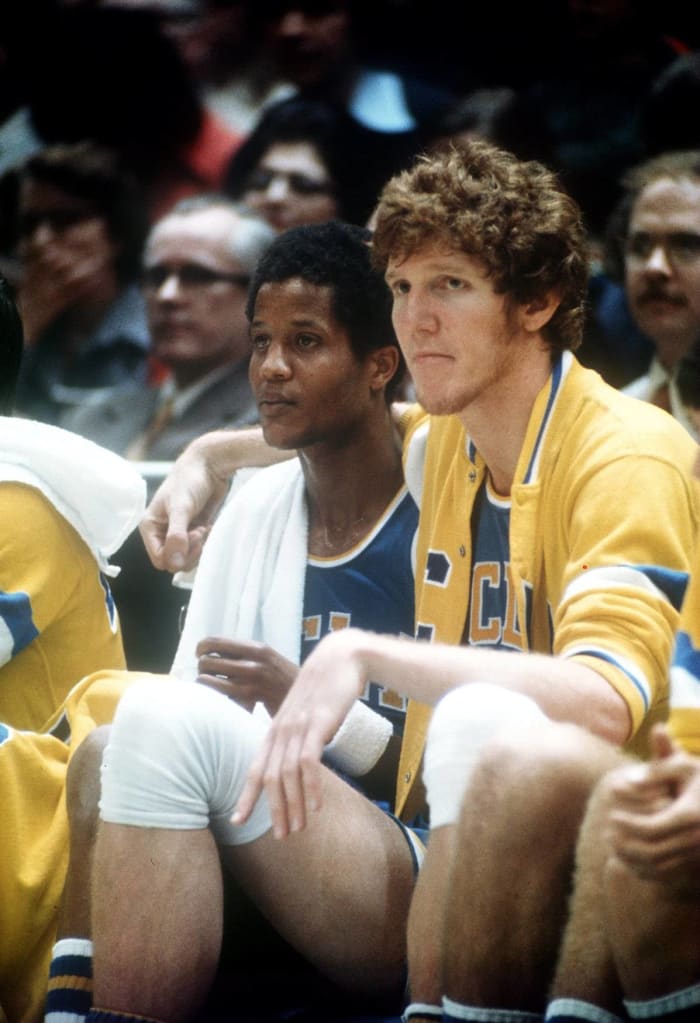
In 1972, Walton joined a large protest against President Richard Nixon and the Vietnam War. He was one of over 1,000 students who demanded that classes be stopped and both the U.S. and California flags be taken down. The group marched to the intersection of Wilshire and Veteran Avenue, where they staged a sit-in, just a few days after Walton had led UCLA to a sixth consecutive national championship.
Serena Williams

Williams has grown to be an outspoken advocate on behalf of the rights of minorities, the LGBTQ community and women’s rights throughout her career. The NAACP honored her with its President’s Award on behalf of her support of the Black Lives Matter movement and fight for gender equity throughout sports. After going through life-challenging health issues during her pregnancy, Williams also brought attention to the issues of inequity in mortality rates for black women in the birthing process.
Matt Whitener is St. Louis-based writer, radio host and 12-6 curveball enthusiast. He has been covering Major League Baseball since 2010, and dabbles in WWE, NBA and other odd jobs as well. Follow Matt on Twitter at @CheapSeatFan.
More must-reads:
- Jacob Blake's father says Bucks contacted him, sent signed jersey
- Baltimore Ravens cancel practice to hold 'social justice reform' meeting
- The 'Active MLB strikeout leaders' quiz
Breaking News
Customize Your Newsletter
 +
+
Get the latest news and rumors, customized to your favorite sports and teams. Emailed daily. Always free!
Use of this website (including any and all parts and
components) constitutes your acceptance of these
Terms of Service and Privacy Policy.

